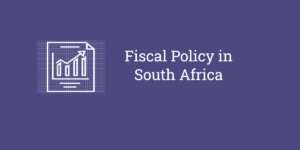The boisterous rotating arms that signalled a need for substitution, a 60:40 split in the voting for national office-bearers and the fact that leftist formations had backed the winning ticket all signalled that something has changed during the ANC Polokwane’s conference. Whatever has changed has spurred on many private-sector commentators and lobbyists to begin the elaborate manufacture of the “Polokwane Strawman”.
The Polokwane Strawman will spend today not only what he does not have, but will spend what he does not have again tomorrow, these wise economists argue.
The anxiety of a vocal section of private-sector commentators is based on the fear that a populist fiscal stance is emerging — and is very undesirable. The spectre of a quick descent into a debt trap, rising levels of inflation and decreased investor confidence haunts the minds of many private-sector analysts. In many ways, this concern is a throwback to the early years of transition, when the private sector viewed the African National Congress as being irresponsible and incapable of managing the economy.
After all these years, is it not amazing that we have not yet unseated the deep-seated biases that an ANC government would sacrifice the immediate, at the expense of a long-run vision? Perhaps, then, the construction of the Polokwane Strawman is an attempt to reign in any progressive movement by indicating that the response from investors will be swift disinvestment and the start of a downwards spiral? In other words, are we witnessing a similar set of strategies used by the private sector in the run-up to the Gear strategy?
The simplification of messages and the obligatory caricature are powerful means of miscommunication and possibly misunderstanding. Inflation targeting and social grants are instructive cases to indicate how myopic the argument of a sudden and irresponsible jump to populism is.
Inflation and social grants
Should Finance Minister Trevor Manuel increase the inflation-targeting band, the “market” would reflect that it is a sudden populist shift. Yet, there would be nothing sudden or populist about such a move.
Polokwane, of course, matters a great deal. However, the debate on inflation targeting has raged over the past few years. Specifically, there has been a debate on the effects of inflation targeting on economic growth. The so-called Harvard Team has, for instance, argued that a more flexible inflation-targeting regime needs to be implemented, in order to support sustainable and long-run economic growth.
At the same time, trade unions and significant sections of the private sector have argued for greater levels of flexibility, with economic growth being a priority. Most importantly, inflation targeting has provided certainty but has not been effective in reducing prices for low-income groups. Yet this long-standing debate will in all likelihood be ignored as the more conservative private-sector commentators seek to raise the spectre of irresponsible fiscal policy.
Another example is the expansion of social grants. Thabo Mbeki announced that men would be eligible for old-age pension from the age of 60, and no longer 65. It is also very likely that Manuel will announce an increase in the value of the means test, thus making more households eligible for the child-support grant. In addition, there is a likelihood that the age for eligibility will be increased from the current 14 years.
These possible changes in eligibility for social security can be traced to long debate and to the recommendations developed by the Taylor commission, which argued for a gradual expansion of social security. Here again, the longer debate and struggles on social security are likely to be ignored, with the usual references to grants creating dependence and that South Africa should not be a “nanny state”. More importantly, it would fail to recognise that even an expansion of the child-support grant to 18 years would still exclude the young and unemployed from any regular social assistance, in an economy that simply does not create the jobs we need.
The central lesson from the caricature of policy debates is that those signalling sudden, quick changes are the very ones that have been marginal in shaping long-run and fairly open policy processes over the past decade. Having been virtually absent from the major policy debates, it is then amazing that they suddenly think that they must save the ANC from itself. It would seem that defeating the Polokwane Strawmen requires the “Super-Invisible Night Watchman” *. But, just remember that this peculiar superhero will want to increase VAT to 15% — tax the poor and give to the rich. (It often surprises me that even representatives of organised business who do work on policy and offer well-crafted options allow the banks and fund-manager economists to take the lead during budget week.)
In turn, am I not creating a caricature of the private sector as disengaged and too conservative? The most demanding way to answer that question is that there is significant policy and political space for a different and more enlightened message.
Internationally, there is a wide agreement that more equal societies grow more quickly and that poverty is reduced. In the cold, hard world of profits, this message makes sense simply because widening economic participation means a growth of a customer base. Consequently, the message from the private sector should link the future of companies to a more equitable society. Until there is such a focus from the private sector, it will continue creating Polokwane Strawman. Yet, we need the private sector in the implementation of any developmental strategy. In the mid-Nineties, organised business was quick to ask civil society for its proposals. In important senses we have come full circle, with civil society able to pose the same question to organised business.
Leftist agenda ?
The war on poverty — together with the description of government as “business unusual” — makes for an optimistic prelude to budget 2008/09. The optimism in these pronouncements is that the government would strengthen its anti-poverty programmes. These are vital questions to engage under the rubric of “improving the quality of spending”. Yet, despite the protestations of private-sector economists, we remain — when compared with our peers — likely to have a modest stance against structural poverty and inequality.
Certainly, the Polokwane resolutions do have a more progressive stance, reflective of the changes in government since 2000, as well as significant campaigning work by civil society. Key examples of the resolutions include the need for an economic planning ministry, expansion of free education up to undergraduate level, and the need to create an asset base for the poor. However, the recommendations taken together offer incomplete and inadequate responses to structural poverty and inequality.
To tackle structural poverty and inequality requires breaking monopoly capital, which can be defined in the practices that have led to price-fixing in the bread, milk and medicines sectors. The fixing of prices is only possible due to significant ownership across the value chain or distribution channels. As each of the industries is subjected to the scrutiny of competition authorities, we will be reminded that price-fixing most negatively affects the poor. The impact that government spending has in such an environment is limited, both because prices are high and because smaller and possibly labour-intensive businesses find it difficult to compete.
At the same time, in the current context, “left projects” must begin to widen opportunities. A key blockage to supporting sustainable exits out of poverty through small business is the absence of angel investing and credit provision. The National Treasury should, for instance, create a favourable tax regime for investors willing to take risks by financing start-ups. In the traditional left discourse this might be heresy, but widening economic opportunities are central to widening the benefits of economic growth.
Most importantly, we simply do not have enough resources on the table. Viewed from the perspective of the national accounts, we are running a surplus. Thus the obvious conclusion is that we have the resources. But, a different vantage point — schools, police stations and hospitals — tells us that these institutions operate on extremely tight and often inadequate budgets.
The introduction of the structural budget balance by the Treasury, however, is extremely important in sustaining these institutions. One of the outcomes of the strategy adopted by the Treasury is that despite the business cycle, government expenditure will be consistent, at the very least. In other words, we will be unlikely to see the cuts we experienced after the Gear strategy.
The structural budget balance is an important part of a broader plan that is emerging in the government. However, because it has not yet elaborated a clear programmatic expression of this, in the minds of many no long-run plan exists. Consequently, the government has not navigated the complex and contested power balances in society to craft a wide societal vision. This limits not only the ability to monitor the effectiveness of budgets, but also fails to pull “big business” and “big unions” into a pact that could potentially transform our society.
Taken together, these factors suggest that the great leftward shift — despite the sleek sound bites of professional economists — is far from a reality. Budget 2008/09 will thus reflect an attempt by the government to deepen our war against poverty, while providing certainty to markets and investors. In so doing, it will reflect a gradual move towards constructing a plan and a budget that over five decades would potentially break structural poverty and inequality.
For civil society, that requires a continued focus on advocacy and campaigning. Otherwise, progressive civil society might just create its own Polokwane Strawman — that battles on social and economic policy will be won in the alliance. It will be won and lost increasingly in the interactions between society (in its many manifestations) and state. It might require thinking the unthinkable, and getting more rational voices to express the views of the markets and engage on social policy — simply because, every time there is a little uncertainty in our society, we cannot keep conceding hard-won gains so that the “fundamentals must be resilient”, especially when the analysis underpinning these calls is alarmist and does not accurately depict long-run policy debates.
I sincerely hope that Manuel does not succumb to the Polokwane Strawman, because he is the minister in charge of the war chest in the war against poverty. He must stand up and indicate that the government will have a responsible but deliberate and ambitious approach to breaking structural poverty and inequality. I hope he also challenges the commentators from the private sector not to just scare-monger, but also to develop credible alternatives — and not just on their pet subject of exchange rates.
* With apologies to all economists without a sense of humour
This article first appeared on the Thought Leader group blog hosted by the Mail and Guardian.


